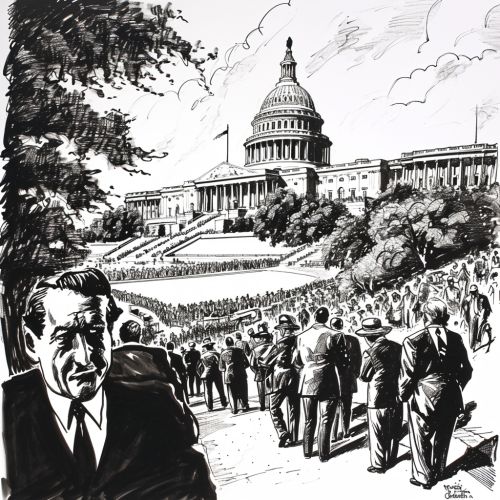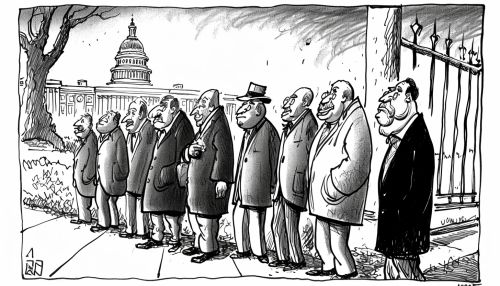Herblock
Early Life
Herbert Lawrence Block, known by his pen name Herblock, was born on October 13, 1909, in Chicago, Illinois. His father, David Julian Block, was a chemist and his mother, Tessie Block, was a native of Poland. Herblock's interest in drawing was evident from an early age, and he began his career in cartooning while still in high school.
Career
Herblock started his professional career in 1929 at the Chicago Daily News, where he worked for a year before moving to the Newspaper Enterprise Association (NEA). At the NEA, he honed his skills and developed his distinctive style. His cartoons were syndicated to newspapers across the country, giving him a national platform.
In 1943, Herblock joined the staff of The Washington Post, where he would remain for the next 55 years. His tenure at the Post was marked by his incisive commentary on the major political and social issues of the day. His cartoons were a fixture on the editorial page, and his work was widely recognized for its wit, insight, and biting satire.
Herblock's cartoons covered a wide range of topics, from domestic politics and foreign affairs to civil rights and the environment. He was known for his sharp criticism of political corruption and abuse of power, and his cartoons often featured powerful figures being held to account. His work was characterized by a strong moral and ethical stance, and he was unafraid to take on controversial issues.
Throughout his career, Herblock was recognized with numerous awards and honors. He won the Pulitzer Prize for Editorial Cartooning three times, in 1942, 1954, and 1979. He also received the Reuben Award for Outstanding Cartoonist of the Year from the National Cartoonists Society in 1956 and 1958.
Style and Influence
Herblock's style was distinctive and instantly recognizable. His drawings were characterized by a bold, graphic quality, with strong lines and dramatic contrasts. His use of symbolism and metaphor was highly effective, and his cartoons often contained multiple layers of meaning.
Herblock was a major influence on subsequent generations of political cartoonists. His work set a high standard for political commentary and satire, and his commitment to social justice and accountability in public life continues to inspire cartoonists today.
Later Life and Legacy
Herblock continued to work at The Washington Post until his death in 2001. His final cartoon was published just weeks before he passed away. His legacy lives on in the Herblock Foundation, which supports educational and charitable activities, including an annual prize for editorial cartooning.
Herblock's work remains relevant and influential. His cartoons are a powerful record of the major events and issues of the 20th century, and his incisive commentary continues to resonate. His commitment to holding power to account and his unwavering belief in the importance of free speech are enduring values that continue to inspire.
See Also


